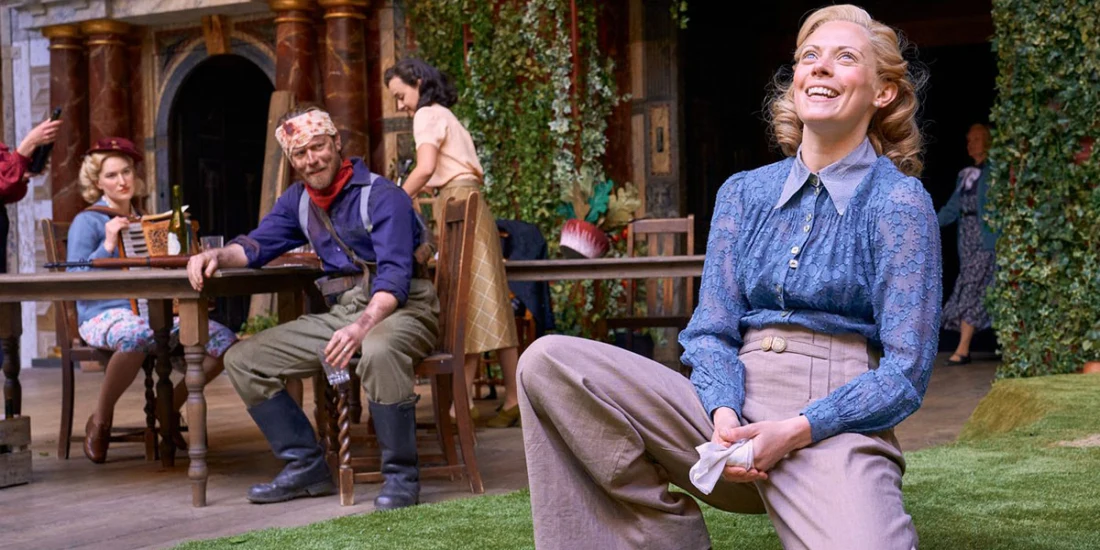'Much Ado About Nothing' review — a lighthearted Shakespeare production, featuring strong performances
If you think too hard about Much Ado About Nothing, things don’t stand up to too much scrutiny — like the title suggests. Why, exactly, does everyone need to keep tricking one another into doing things? What are the villain’s motivations again?
Lucy Bailey’s new production for Shakespeare’s Globe introduces some additional questions: if this is the 1940s, and the war that begins the play is thus implied to be World War 2, which side are our wacky, very Italian heroes on? Is everyone drunk, and is that supposed to explain things? What does this play really have to say about gender and love? If you don’t really think about it — and bask in the ambiance of being back in the Globe with a full audience — you’ll pass a perfectly fine evening.
The highlights are in the performances, especially Ralph Davis as Benedick and Lucy Phelps as Beatrice, bringing sparkly Katharine Hepburn and Jimmy Stewart energy to the quarrelling lovers. Bailey’s guidance for her performers seems to be to embrace the plot’s absurdity, to just throw themselves into the idea that their characters are being ridiculous.
It’s mostly David and Phelps (along with Ferdy Roberts’ Don Pedro, proposing extremely stupid plans with delightful seriousness) who find some humanity to anchor their characters’ total lack of self-awareness. They’re the smartest, brightest people in the room, and they do not know themselves at all. Their banter and romance alike are sweet and satisfying, the meeting of two sharp-edged people who just might learn how not to hurt each other.
Beatrice and Benedick have always dominated this play, but Bailey doesn’t help the rest of the story’s case. The onstage, accordion-forward quintet is charming, but the constant music disrupts the pacing throughout, leaving the actors to fight to find enough energy to keep the story’s momentum going.
Bailey and designer Joanna Parker have transformed the Globe into an Italianate garden, with creeping ivy and banks of grass sweeping out into the yard. Text is changed to emphasise the Italian setting as well — “pounds” to “lira,” most of the play’s songs swapped out for Italian tunes, and, most bafflingly, changing the setting of “Messina” to “Veneto” throughout.
This last is presumably in service of the aforementioned question of whether our cast of World War 2 Italian soldiers are, you know, fascists — they enter singing “Bella Ciao,” so signs point to a deliberate if not wholly clear attempt to align them with northern Italian resistance movements. But, like many of Bailey’s ideas, it doesn’t really come to anything.
If anything, it’s complicated by the decision to dress the watch (led by George Fouracres as an extremely funny Dogberry) as mini-Mussolinis. Katy Stephens’s Leonata greets Dogberry with slight wariness when he arrives to report on the misdeeds of Conrade and Borachio, but the idea that this family of resistance fighters is scared of the authorities’ arrival is one that can’t really be sustained by the actual dialogue they share, nor by Dogberry’s ultimate role in the plot, which is to solve the main characters’ problems despite his buffoonery. If anything, it accidentally suggests these silly fascists are a bit useful despite how stupid they are — after all, at least they catch the crooks in the end.
Similarly, the transformation of the play’s patriarchs into Leonata and Antonia (Joanne Howarth) makes for an intriguing opening stage picture, a group of women alone in an idyllic garden. I kept waiting for the choice to illuminate or sharpen the play’s many ideas about gender, but once again, nothing happened.
More of Leonato and Antonio’s dialogue than usual is retained, and Howarth and Stevens find a delightful sisterly energy, but the shifting of the play’s poles to establish the home as an all-female space — the shift from a father berating his apparently disgraced daughter to a mother doing so, in the play’s brutal wedding scene — simply left no mark.
Like the setting, it felt half-formed and incidental. And though the play’s plot may be a little too silly to look at too closely, its themes are richly woven — it’s a silly story with a lot to say. Despite the best efforts of her leads, Bailey’s production can’t settle on anything to say about it. Just sit back and enjoy the open air.
Photo credit: Much Ado About Nothing with Lucy Phelps as Beatrice (Photo by Manuel Harlan)
Originally published on
